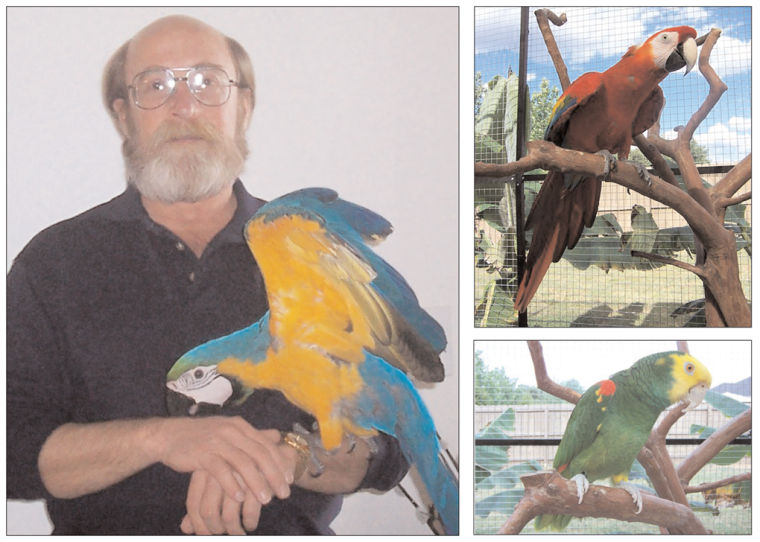Sanctuary home for displaced birds
Published 2:33 pm Wednesday, December 26, 2007

- Dave Spulin, founder of Parrots-R-4Ever Avian Rescue and Sanctuary in Huntsville, above left, poses with Toby, a blue and gold macaw who is a permanent resident of the rescue. Lucy, top left, a 25-year-old scarlet macaw is available for adoption, as is Pancho, above right, a 7-year-old yellow-headed Amazon parrot.
All Dave Spurlin and his 100 displaced exotic birds needed for Christmas was a reliable truck or van, about 7 to 10 acres of land and some select adoptive parents.
If that sounds like a teenager’s unrealistic Christmas list, consider this: The Huntsville bird rescuer and his volunteers are trying to take care of 100 displaced birds and about 100 more are waiting to be admitted.
Where did all the birds come from?
Some came before the federal government banned such imports. But others come from people who continue to breed and sell exotic birds.
“They are just flooding the market with it,” said Spurlin, who founded Parrots-R-4Ever Avian Rescue and Sanctuary, or PARS, along with his wife, Vickie. “They have all kinds of excuses, such as they are the perpetuating the species, but research shows that sloppy breeding is decreasing the lifespan of the birds and damaging them.”
It is the same tragedy afflicting the dog and cat population.
“It’s a repeat of the same story only those numbers have stabilized over the past 10 years,” Spurlin said. “But the (number of) birds are just going through the roof.”
It is the goal of PARS to try to rescue birds, but also to teach people that exotic birds are not for everyone and to teach owners how to care for their birds.
“The biggest problem is that people really don’t understand, particularly with the parrots, that these birds require a major investment of time and effort,” he said. “They think they are cute or they look good with their furniture or their drapes.”
Many of the birds – Umbrella Crested cockatoos, Scarlet and Blue and Gold Macaw parrots, Congo African Grey parrots, Nanday Conures parrots, Quaker parrots, lilac crowned or yellow-headed Amazon parrots, Meyers parrots, love birds and others – are residents because their owners died or they can no longer properly care for them. Many of them need medical care.
“They are extremely intelligent and extremely sensitive,” Spurlin said. “If they don’t get the attention they need, “they start to break down and become pluckers or self-mutilators.”
The typical parrot has the reasoning of a 5-year-old and the emotional complexity of a 2-year-old, he said.
“Some of these birds live to be 80 to 100 years old,” said Mark Lott, PARS volunteer from Athens. “When you get one, you have to will it to someone because it outlives you. A lot of people don’t understand that. A lot of people say, ‘I’d love to have one,’ and for the first year it’s great. Then it’s an inconvenience. It’s like having a toddler the rest of your life.”
The photographs of self-mutilated birds on Spurlin’s Web site – www.parrotsr4ever.com – are disturbing but ones prospective bird owners should see. The Web site also features before and after photos of damaged birds now recovering because they are receiving proper attention as well as photos of birds available for adoption.
How to help
There are several ways you can help the people helping the birds at PARS.
• They need someone to donate a reliable truck or large van to transport birds and cages.
• They need someone to donate 7 to 10 acres of land on which to develop a permanent facility and educational park for Parrots-R-4Ever and it’s residents. Their waiting list for admission often exceeds 100 birds and they have to turn others away because they do not have room.
• They need volunteers to socialize or bathe birds, clean cages, make chew toys and translate information from the English Web site to the Spanish and German Web sites. If you are considering an exotic bird but are unsure you could be an owner, this is a great way to interact and enjoy these wondrous creatures.
“We have one volunteer who loves birds but is afraid of them who comes every week to clean cages,” Spurlin said.
• They need caring, attentive people to adopt birds and care for them for the rest of their lives.
Birds right for some
Lott and his wife, Angela, and their12-year-old daughter, Kaitlin, have quite a menagerie at home – four birds, a collie, a Great Pyrenees and a horse.
“We have them for companionship,” said Lott, who works in the melt shop at Nucor Steel. “It’s like having another child when you can talk to them and they talk back. They’re gorgeous, beautiful and intelligent and I love working with them – it’s a challenge. ”
The family has a white Umbrella Crested cockatoo named Angel, a Condo African Grey parrot named Bubba, a Scarlet Macaw parrot named Tutu and a Solomon Island eclectus named Nina.
Birds were the right choice for them because they enjoy giving them attention and making them part of the family.
The bigger the bird the harder it is to care for, Lott said.
“If you ignore them and they get stressed, their feathers fall out or they pluck them out,” Lott said. “They need correspondence with humans. Most are raised by breeders and they don’t know any other way. If they don’t get that interaction, it affects them.”
By appointment only
PARS is not open to the public. Prospective adoptive parents, volunteers and foster-home candidates may visit the sanctuary, but by appointment only.


